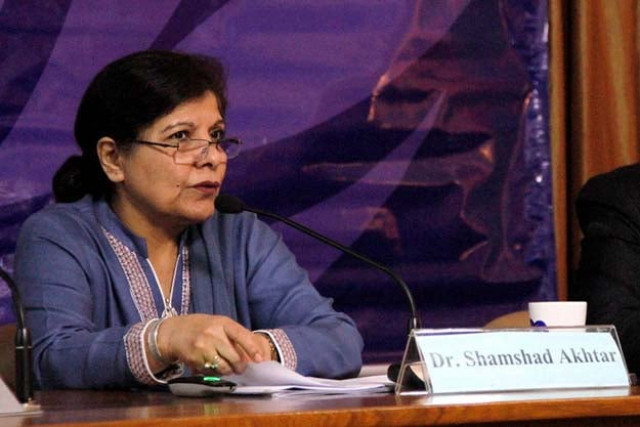Steady increase: Social development essential for economic growth: Akhtar
Says 2016 will reflect how Asia-Pacific region implements 2030 agenda

Says 2016 will reflect how Asia-Pacific region implements 2030 agenda. PHOTO: www.un.org
Social and environmental development is a pre-requisite for sustained growth.
The UN Executive Secretary General United Nations Dr Shamshad Akhtar said that 2016 is a year for reflection on how the Asia Pacific region will position itself for implementation of the 2030 agenda for sustainable development.
Speaking, in a video message, at the launch of a report, “Economic and Social Survey of Asia and the Pacific, at National University of Science and Technology Akhtar said that Asia and the Pacific have the dynamism to revive economic growth.
“Asia can improve the quality of its growth by making it more inclusive and sustainable. Further rebalancing towards domestic and regional demands as well as broad based productivity gains should drive the next phase of Asia Pacific growth. This requires higher and targeted fiscal spending, enhanced skills, better infrastructure and improved agriculture productivity,” she said while mentioning various revelations of the report.
UN Resident Coordinator Neil Buhne also discussed the report with economic students and journalists.
“Islamabad is a city that is as clean as Switzerland but that’s not the case in most of the other cities where my colleagues of United Nations serve,” she said adding that the air is bad, there are all sorts of examples of unsustainable growth so the themes in the title are directly relevant to the challenges, which the region is facing.
She said the topic was especially relevant to the challenges Pakistan is facing particularly because Pakistanis know the issues with inequality, the number of people who have been excluded from benefits of growth, the situation in urban areas with unsustainable development. “These issues are also relevant with the Sustainable Development Goals announced in September 2015 at the UN General Assembly,” Buhne said.
Former chief of Macroeconomic and Policy Section UNESCAP Dr Muhammad Hussain Malik discussed several findings of the survey and generalised that growth has slowed down after the economic and financial crisis particularly after 2010 in the South Asia and Pacific. “The improvement of total factor productivity is the way to deal with this economic crisis. Growth can also be accelerated by reviving domestic demand of investment and consumption,” he said while mentioning that inflation in South Asia and Pacific is finally coming down which has resulted in a decrease in the interest rate.
Principal and Dean of School of Social Sciences and Humanities (S3H) NUST Dr Ashfaque H Khan said that low inflation has produced a disincentive for the producer to produce more, which is one of the reasons for the decrease in growth. “There is a dire need to change our policy stance in order to grow,” he said.
He further said that with the growth of cities and with people moving from rural to urban areas, crimes are also increasing because people’s needs are growing with each passing day but employment opportunities are not growing at the same rate.
Published in The Express Tribune, April 29th, 2016.






1724319076-0/Untitled-design-(5)1724319076-0-208x130.webp)












COMMENTS
Comments are moderated and generally will be posted if they are on-topic and not abusive.
For more information, please see our Comments FAQ